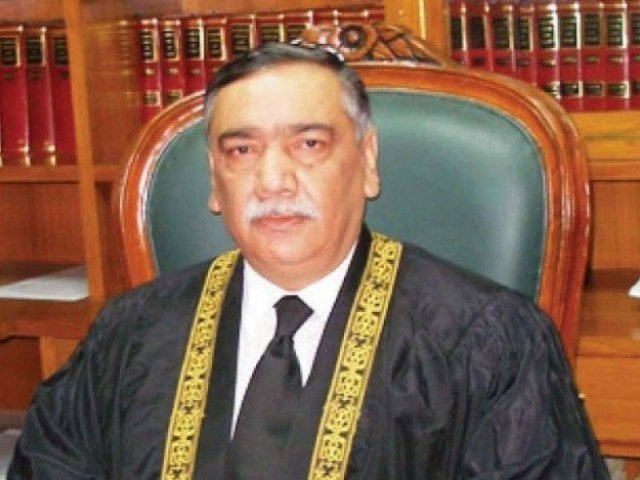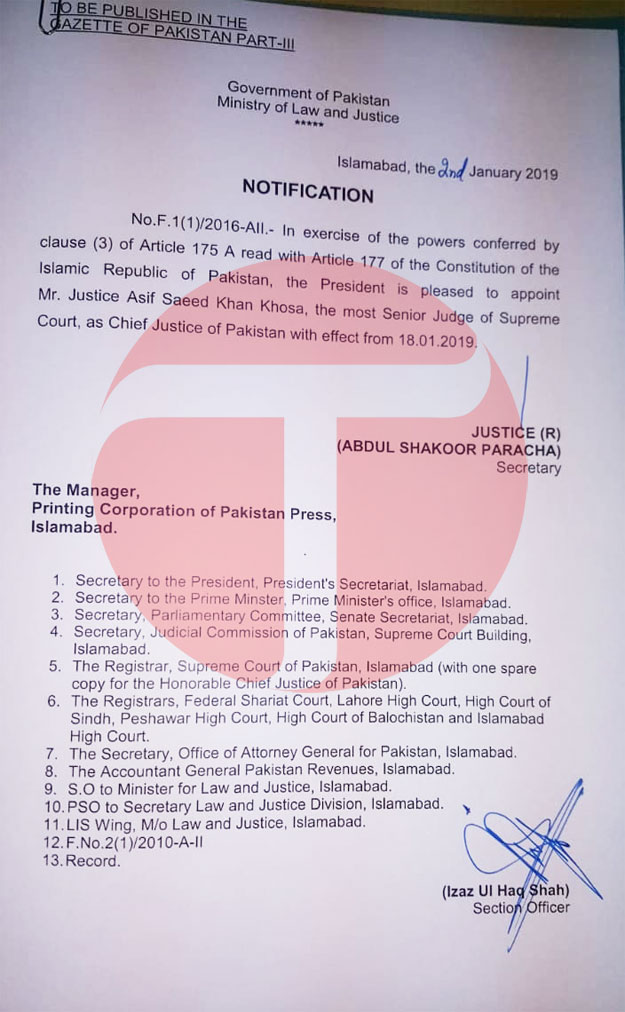Justice Asif Khosa to replace Justice Saqib Nisar as CJP
Justice Khosa will take charge as the top judge on January 18 and will serve until December 20, 2019

Asif Saeed Khosa. PHOTO: FILE
Justice Khosa, who is son-in-law of former chief justice Nasim Hassan Shah, is seen as one of the top jurists on criminal law. During his career, spanning over a period of more than nineteen and a half years so far, he has decided about 55,000 cases.
Born in Dera Ghazi Khan on December 21, 1954, Justice Khosa obtained his law degree from the UK in 1976. He will serve as the chief justice until December 20. He was among the Lahore High Court (LHC) judges, who refused to take oath under the November 3, 2007 Provisional Constitution Order (PCO).
The biggest contribution of Justice Khosa in his career is that he cleared backlog of criminal cases. He decided over 10,000 cases of criminal nature since 2014. At present, a few hundred criminal appeals are pending.
Justice Khosa sets record in deciding criminal cases
When a special bench, led by Justice Khosa, got active, criminal appeals, which were filed in 1994, were pending. The bench cleared all pendency and now it is hearing appeals filed during 2018.
Interestingly, there is no concept of adjournment in Justice Khosa's court. It has been witnessed that after hearing every case, Justice Khosa dictates the orders in the courtroom and announces them without reserving the verdicts.
Due to his interest and hard work, dozens of convicts had been acquitted and released after imprisonment of more than a decade. Likewise, he initiated steps for speedy trial in murder cases in a few districts of Punjab.
The incoming chief justice was elevated to the Supreme Court on February 18, 2010. Later, he remained part of a number of benches and authored landmark judgments in many high-profile cases. He is the judge who authored a ruling that no second FIR [first information report] can be registered in criminal cases.
In National Reconciliation Order (NRO) case, he was part of seven-judge larger bench, which disqualified former prime minister Yusuf Raza Gilani in 2010. He wrote an additional note in Gilani disqualification verdict. Also, Justice Khosa led the larger bench that heard the Panama leaks case. He was the first who disqualified former prime minister Nawaz Sharif under Article 62 (1)(f) of the Constitution.
Senior lawyers believe that Justice Khosa was the one who highlighted discrepancies in the replies submitted by the Sharif family during the hearing. Likewise, his verdict in Anwar Saifullah case is also famous.
Justice Khosa has also given his view how to deal matters related to corruption. The senior lawyers believe that there is need to debate on his approach to deal white-collar crime cases. In his 192-page judgment in Panamagate case, he says that corruption at high places is not a new phenomenon but the methods of corruption and concealing the proceeds of corruption have seen a dramatic change in recent times.
Justice Khosa believes that the standard of proof in relation to corruption and corrupt practices is 'balance of probabilities' (allowing inferences from circumstantial evidence) and not 'beyond reasonable doubt'.
In contempt cases, Justice Khosa is not lenient. He authored the verdict of sentencing Pakistan Muslim League-Nawaz (PML-N) Senator Nehal Hashmi for one month, even though Hashmi had tendered unconditional apology in that case.
Likewise, he was heading the larger bench, which sent police officials behind bars in contempt matter related to the manhandling of former chief justice Iftikhar Muhammad Chaudhry in March 2007. However, he disposed of contempt notice against two media men last year.
Likewise, Justice Khosa issued verdicts against two high court judges. Recently, Justice Khosa, being a member of Supreme Judicial Council, authored opinion about the removal of Islamabad High Court judge Shaukat Aziz Siddiqui.
Likewise, he also reversed Special Court's verdict to implead former chief justice Abdul Hameed Dogar, former prime minister Shaukat Aziz, then law minister Zahid Hamid in treason case, wherein the federal government only lodged complaint against former military ruler Pervez Musharraf. The judge had asked the special court to conclude treason case expeditiously.
He also gave the landmark ruling in Salman Taseer murder case, in which he restored terrorism charge against murderer Mumtaz Qadri and upheld his death sentence. Likewise, Justice Khosa also highlighted a number of discrepancies in the Aasia Bibi blasphemy case. And on the basis of those discrepancies, Aasia got acquitted.
Recently, Justice Khosa is also heading a committee, which gave recommendations on police reforms in the country. He has also proposed appropriate amendments to the National Accountability Bureau (NAB) law.
Legal experts praise Justice Khosa's boldness. Renowned lawyer Faisal Siddiqui said that an overview of Pakistan's judicial history showed that no judge had achieved such a disposal on the criminal side, especially since the 1990s when the pendency of criminal cases really started multiplying.
"So it's a great achievement which will take him into the annals of judicial history. Apart from this, he has achieved two other things — he is one of those judges who have rewritten the criminal jurisprudence in Pakistan, in addition to laying down new jurisprudence on Mumtaz Qadri and former prime minister Nawaz Sharif cases, which not only required quick disposal but also a lot of courage."
Saif ul Malook, who defended Aasia Bibi told The Express Tribune that judge like Justice Khosa are born after centuries. "Had Justice Khosa not been on the bench, the result might have been different in Aasia Bibi case," Malook said.
The legal experts believe that the biggest challenge for Justice Khosa will be to create a balance between accountability of political elite and supremacy of civilians. Likewise, it is also a challenge for him to end this misperception that judiciary is part of any game plan to weaken the civilian supremacy and do selective accountability of politicians.




















COMMENTS
Comments are moderated and generally will be posted if they are on-topic and not abusive.
For more information, please see our Comments FAQ